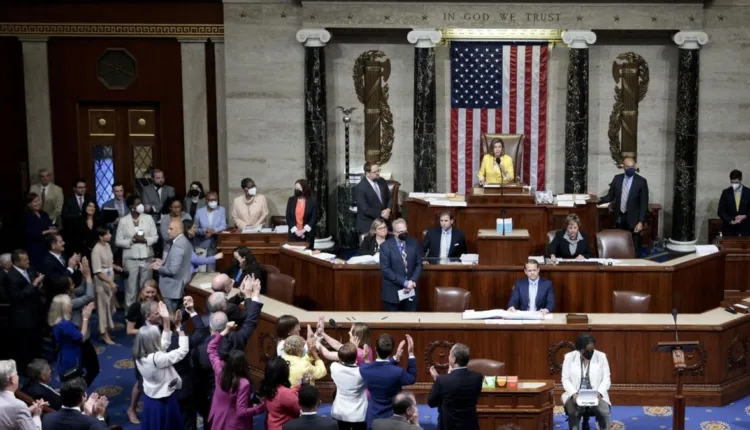
Biden Receives Climate, Health, Tax Reform Proposals
TL/DR –
The US House of Representatives passed the Inflation Reduction Act, a significant piece of legislation aiming to reshape the American economy and environmental policy. The Act is designed to generate $737 billion in new revenue through tax and health care savings, reducing the national debt by over $300 billion, and investing $437 billion into climate change initiatives and the extension of the Affordable Care Act. However, it faced unanimous opposition from Republicans who argue it will escalate energy costs, fail to curb inflation, and raise taxes on average Americans.
The recent House of Representatives’ vote (220-207) sends the Inflation Reduction Act, a milestone in U.S. legislative history, to President Joe Biden for approval. The legislation, a result of intense negotiations between Senate Majority Leader Charles Schumer and Senator Joe Manchin, aims to reshape America’s economy and environmental policy.
The Inflation Reduction Act Explained
The legislation is designed to generate $737 billion in revenue through tax and health care savings. The Democrats predict that this will reduce national debt by over $300 billion while investing $437 billion into climate change initiatives and the extension of the Affordable Care Act. The Act signifies a significant downsizing from the original proposal after Manchin withdrew his support citing concerns over its size.
Key Components: Climate Change and Healthcare
The Act sets aside $369 billion for green energy, marking a record investment in U.S. climate change initiatives. It aims to promote domestic manufacturing of solar panels, wind turbines, and batteries and introduces tax credits to reduce carbon emissions. On the health care front, the Act allows Medicare to negotiate drug prices, saving an estimated $265 billion. Despite Republican criticisms, it proposes a 15% minimum corporate tax and anticipates raising $124 billion via increased IRS tax enforcement.
Controversies and Opposition
The Act’s passage faced unanimous opposition from Republicans, arguing that it will increase energy costs, fail to tackle inflation, and raise taxes for average Americans. House Minority Leader Kevin McCarthy dubbed it “the largest tone-deaf bill” in history. Despite this, proponents view it as a significant step towards addressing climate change, healthcare reform, and fiscal responsibility.
The Inflation Reduction Act’s implementation opens a new chapter in America’s fight against climate change and its quest for equitable healthcare. The full impact of this significant investment, particularly in climate action and healthcare reform, is yet to be seen. As the Act comes into effect, discussions around its implementation and outcomes will continue to shape American policy discourse and its global leadership role on pressing contemporary issues.
—
Read More US Economic News
